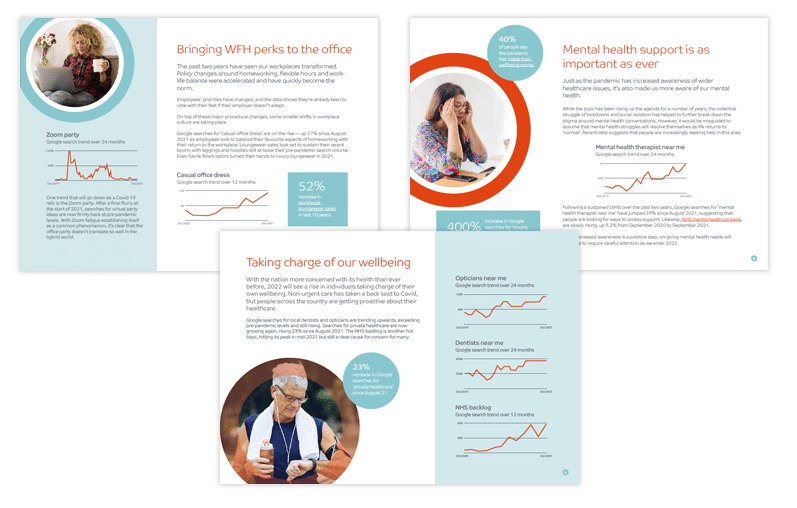As we enter the new year, Covid once again dominates the health and wellbeing headlines. With the job market heating up and over a quarter of workers still looking for more support from their employer, business leaders will need to take a proactive approach to wellbeing to retain their top talent and maintain morale.
If the past two years have taught us anything, it’s that ‘what comes next’ is inevitably hard to predict. Our yearly Wellbeing Trends report helps you get a head start on workplace wellbeing, as we explore the emerging hot topics and trends for the new year. These top five trend predictions can help you plan and prioritise your wellbeing support for 2022.
Download this infographic as a PDF
1. Taking charge of our health
Awareness of key healthcare issues has increased and people are proactively taking care of their day-to-day wellbeing.
Fitness tracker sales continue to grow, with wearable and smart technology empowering people to prioritise fitness in their daily lives.
At the end of 2021, Google searches for local dentists and opticians were at an all-time high, and searches for private healthcare increased 23% in the final three months of the year. As the pandemic wears on, people are looking to take control of their own health and make positive lifestyle changes beyond their typical New Year’s resolution.
2. Making mental health support a priority
While the stigma around mental health conversations is reducing, recent
data suggests that people are increasingly seeking support in this area.
According to data by the Office of National Statistics, 40% of Britons say the pandemic has made their wellbeing worse. This is backed up by Google search trends, with a 300% increase in searches for ‘mental health therapist near me’ since 2019.
Employers can play a key role in supporting workers with their mental health, with managers best placed to spot those struggling with stress and low morale. Our free workplace mental health resources can help you provide on-going support that’s tailored to suit your people.
3. Employees will expect more workplace benefits
The pandemic has revealed how different work environments compare, and employees are more informed than ever about the typical policies and perks common to their sector.
Employees’ new priorities became particularly apparent towards the end of 2021, with 52% considering changing jobs before March 2022. People are searching for specific benefits and becoming more choosy about the job roles they apply for — 47% say flexible working is more important to them in light of the pandemic.
November 2021 saw a 400% increase in searches for document templates, with CV templates topping the list. As the job market continues to heat up, HR managers must make sure their employer brand and benefits package is compelling enough to retain and attract the top talent.
4. Community-focused wellbeing
Pandemic behaviours such as mask-wearing and self-isolation have
made us more aware of how our health impacts those around us. And with the climate crisis hitting headlines throughout 2021, our sense of social responsibility continues to grow.
COP26 influenced our Googling, with searches for ‘sustainability’ doubling during November 21. And that same month, the ONS revealed that 75% of British adults say they worry about climate change.
Job hunters will be increasingly concerned with how their own beliefs and priorities line up with their employer’s mission statement. In this fast-moving job market, clearly communicated company values could be the deciding factor between two competing offers.
5. New normal, same money worries
According to the ONS, 62% of adults said their cost of living had increased between October and November 2021 — a trend that looks set to continue as price hikes and inflation hit consumers’ pockets. As we enter the new year, wellbeing concerns surrounding finances, stress and burnout will return to the forefront.
While Covid has dominated health headlines for two years now, day-to-day worries rumble on, especially where money is concerned. Between September and November 2021, Google searches for ‘energy crisis’ increased 1,550%, as gas bills spiralled to record highs.
When people are feeling the pinch, their mental health is likely to take a hit. Employers can support their people with common wellbeing concerns, including financial hardship, through clear signposting. Services such as Citizens Advice and StepChange can offer guidance on how to ease the pressure during difficult times.
Read the full report
Our 2022 Wellbeing Trends report features over 20 pages exploring emerging hot topics for this year.
It uses data from Google search trends, the Office for National Statistics, the NHS and our wellbeing research to help business leaders, managers and HR teams get a head start on supporting their people as we enter 2022.

